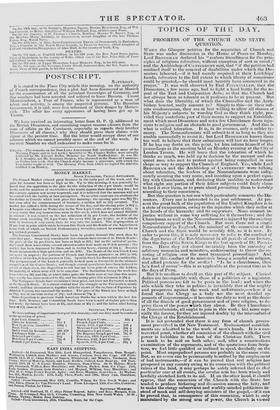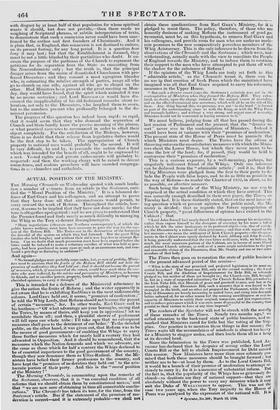TOPICS OF THE DAY.
PROGRESS OF THE CHURCH AND STATE QUESTION.
WHEN the Glasgow petition for the separation of Church and State was under discussion in the House of Peers on Monday, Lord BROUGHAM declared his "zealous friendliness for the prin- ciples of religious toleration, without exception of sect or creed ;" and the Archbishop of CANTERBURY said, that " if the petition had confined itself to the removal of disabilities under which the Dis- senters laboured,—if it had merely required at their Lordships hands, toleration to the full extent to winch liberty of conscience could be granted,—he should most heartily have concurred in its prayer." It was well observed by Earl FITZWILLIAM, that the Dissenters, a few years ago, had to fight a hard battle for the re- peal of the Test and Corporation Acts; so that the Church had not always been so tolerant as it professes to be at present. But what does the liberality, of which the Chancellor and the Arch- bishop boasted, really amount to? Simply to this—in their infi- nite condescension, they are at last willing to allow all classes of his Majesty's subjects to worship God as they think right, pro- vided they contribute part of their means to support an Establish- ment which most Dissenters and not a few Churchmen deem inju- rious to religion and an obstacle to good government. And this is what is called toleration. It is, in its essence, only a milder ty- ranny. The Nonconformists will submit to it as long as they am unable successfully to resist it; but Lord BROUGIIAM knows them too well to believe that their submission will last an hour longer. If he has any doubt on this point, let him inform himself of the proceedings at the meeting held on Monday evening at the City of London Tavern. He will learn that the toleration of which he thinks so much, was held up to derision by the earnest and elo- quent men who met to protest against being compelled in any shape or way to support the Church of England. Yes, while Lord BROUGHAM and the Archbishop Of CANTERBURY were talking about toleration, the leaders of the Nonconformists were indig- nantly scouting the very name, and insisting upon a perfect equa- lity with Churchmen, and declaring their inability to understand what right any portion of their fellow subjects could fairly claim to lord it over them, or to prate about permitting them to worship according to their conscience. But this question is not one which particularly concerns the Dis- senters. Every one is interested in its just settlement. At pre- sent the great bulk of the population of the United Kingdom is in a state of exasperation, owing to the injustice which they suffer at the hands of the hierarchy and its supporters. None commit in- justice without in some way suffering for it themselves; and the Churchman as well as the Nonconformist is injured by the existing compulsory support of the Church. But were there not a single Nonconformist in England, the mischief or the connexion of the Church and the State would be sensibly felt, as it is now. In order to prove this, it is only necessary to refer to the conduct of the dignitaries of the Establishment in all periods of our history, from the slays of the Saxon Kings to the last speech of Dr. PHI rms. Have they not almost invariably been the mainstay of arbitrary monarchs and ministers, endeavouring to throw the co- vering of religion over the most tyrannical proceedings? And does not this conduct of its ministers bring a scandal on religion, and afford pretexts for the scoffer? "Is he a churchman, then he's fond of power"—this is as applicable at the present time as in the days of POPE.
But it is needless to dwell on this part of the subject. Clerical duties are incompatible with those of a politician or a legislator.
Political parsons are felt to be pests in the land ; and when the side which they take in polities is invariably that of the mighty and prosperous against the weak and unfortunate,—when it is found that the Clergy as a body are the most decided op- ponents of improvement,—it becomes the duty as well as the desire of all the friends of good government and of pure religion, to de- prive them of' the power which they abuse. Be they Churchmen or Nonconformists, all ought to join in this work ; but more espe- cially the former, for they are injured doubly by the misconduct of the Clergy of the Establishment.
It is not pretended that there is any form of church govern- ment prescribed in tilt New Testament. Ecclesiastical establish- ments are admitted to be the work of men's hands. It is a con- troverted point, whether all connexion of the church with the civil power is forbidden in the book of the Christian faith., There is much to be said on both sides ; and, after a conscientious examination of the arguments, and of the quotations from Scrip- ture, we feel little qualified or inclined to speak decidedly on the point. Most unprejudiced persons are probably in the same state. But, as no cause can be permanently benefited by the emplo) merit of bad instruments,—if it can be proved that real religion has prospered in any country owing to its connexion with the political rulers of the land, it may perhaps be safely inferred that in that particular case at all events, the secular arm has been wisely and lawfully stretched forth to its aid. If, on the other hand, it should appear, that the connexion of the Church with the State has tended to produce bickering and dissension among the laity, and to make the clergy subservient and worldly-minded politicians in- stead of meek and self-denying ministers of the gospel,—if it can be proved that, in consequence of this connexion, which is only maintained by the strong arm of power, the Church is viewed with disgust by at least half of that population for whose spiritual wants it should, but does not provide,—then there needs no weighing of Scriptural phrases, or subtile interpretation of texts, to demonstrate that such a connexion never could have been sanc- tioned by the author and first founders of Christianity. And it is plain that, in England, this connexion is not destined to endure, on its present footing, for any long period. It is a question how long it may last ; but that the Establishment is doomed, they must be not a little blinded by their partialities who doubt. It an- swers the purpose of the partisans of the Church to represent the petitions for its separation from the State as emanating from the Nonconformists only ; but the truth is, that the principal danger arises from the union of dissatisfied Churchmen with pro- fessed Dissenters ; and they commit a most egregious blunder who, in estimating the relative strength of parties, range all who go to church on one side, against all who go to chapel on the other. Had Ministers been present at the great meeting on Mon- day, they would have found, that the spirit which animated it was by no means sectarian ; and Lord BROUGHAM would have dis- covered the inapplicability of his old-fashioned remarks about to- leration, not only to the Dissenters, who laughed them to scorn, but to the numbers present who professedly belonged to the do- minant persuasion. The progress of this question has indeed been rapid ; so rapid, that it would seem that they who demand the separation of Church and State hardly know the precise meaning of the phrase, or what practical measures to recommend in order to effect their object completely. For the satisfaction of the Bishops, however, there is no doubt that their release from legislative duties would be the first step to be taken. The appropriation of Church property to national uses would probably be the second. It will be Very difficult, by and by, to persuade the nation that a fund which was intended for the benefit of all, ought to be engrossed by a sect. Vested rights and private endowments will probably be respected: and then the working clergy will be raised to decent competence, and zealous preachers will have crowded congrega- tions in our churches and cathedrals.





















 Previous page
Previous page